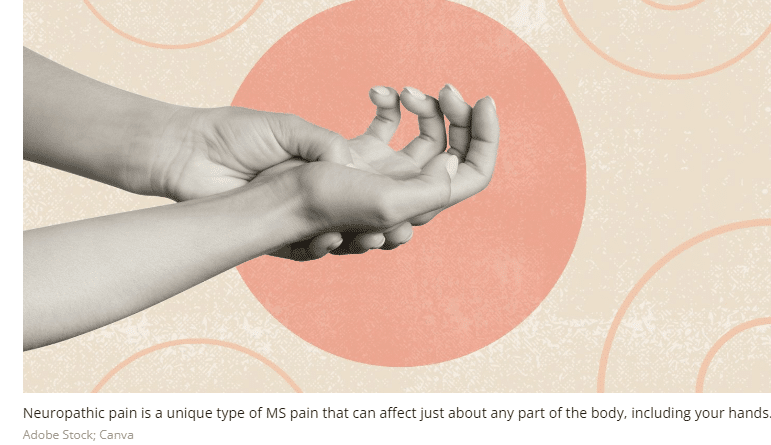Neuropathic pain is not your average pain. Here’s what to know about this unique type of MS pain and how to find relief.
written by: Kerry Weiss
Medically Reviewed by Sanjai Sinha, MD
Published on October 12, 2022
Pain is a common symptom of multiple sclerosis (MS), especially when the spinal cord is affected. But it’s very different from pain caused by, say, a broken bone or burn. MS pain is neuropathic, meaning the nerves generate it, but without any sort of injury or tissue damage present.
“I describe it as electrical short-circuiting in the nerves that signals to the brain something is wrong in the area those nerves supply,” explains Robert Bermel, MD, a neurologist at the Mellen Center for Multiple Sclerosis at Cleveland Clinic. “It’s like false pain signals being sent because the nerves aren’t functioning correctly.” (By contrast, an injury prompts nociceptors — a nerve ending that senses pain — to send signals to the brain so you feel pain where you’ve been hurt.)
For this reason, typical pain treatment won’t relieve neuropathic pain caused by MS. But if it’s something you’re dealing with, there are effective ways to manage it.
What Is MS Pain Like?
“Many people say, ‘It’s not like anything I’ve ever felt before,’” says Dr. Bermel. Among the more specific descriptions of neuropathic pain are:
- Burning hot
- Icy cold
- Stabbing
- Sharp
- Achy
- Prickling — like pins and needles
- Numbness
- Pain or discomfort with light touch, also known as allodynia
- Squeezing — a sensation known as the “MS hug”
The level of pain from MS can vary dramatically, from minor irritation to intense discomfort. Neuropathic pain most often affects the legs, feet, arms, and hands. Some people feel it in their faces. It’s unpredictable, too, and can have a major impact on daily activities and quality of life.
Medication for MS Pain
If you’re dealing with neuropathic pain from MS and it’s not affecting your quality of life, you may be able to live with it. If you need relief, though, over-the-counter pain medications won’t work, nor will prescription opioids or other narcotics.
“The brain can’t tell the difference between neuropathic pain and pain from tissue damage,” Bermel explains. “The difference is that [with pain from tissue damage], you need to heal the tissue. With neuropathic pain, we generally need to suppress those neuropathic pain signals.”
Although antidepressants or anti-seizure medications aren’t approved by the U.S. Food and Drug Administration for the treatment of neuropathic pain, doctors often prescribe them for MS patients to help dull the pain signals. “We borrow a lot of our treatment strategies from other neuropathic pain conditions, such as trigeminal neuralgia and diabetes,” says Bermel.
Managing MS Pain Without Drugs
Aside from using medication, there are other steps you can take to help manage neuropathic pain: CLICK HERE to continue reading.



